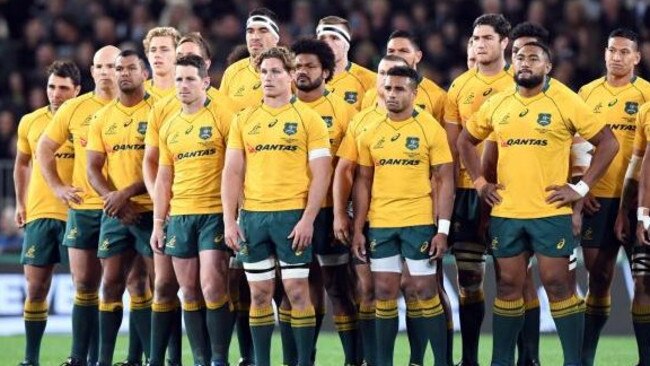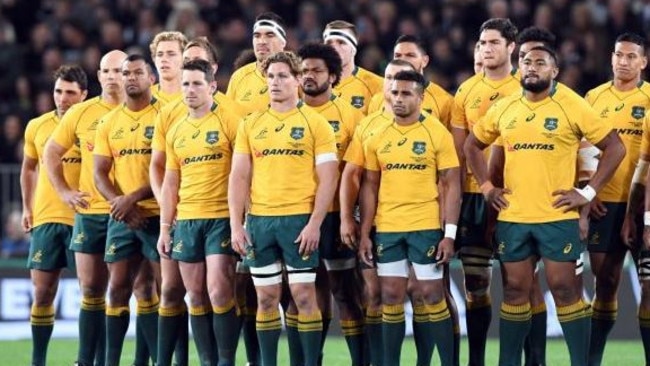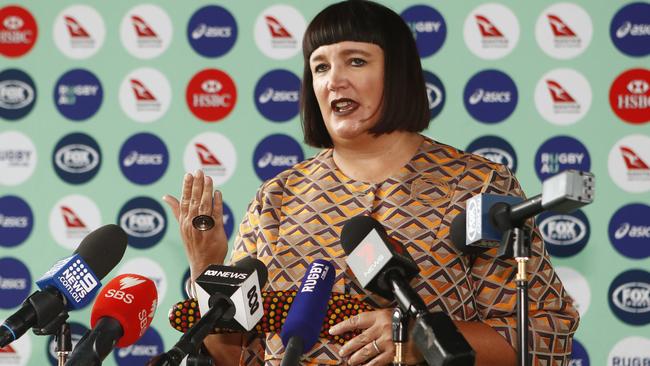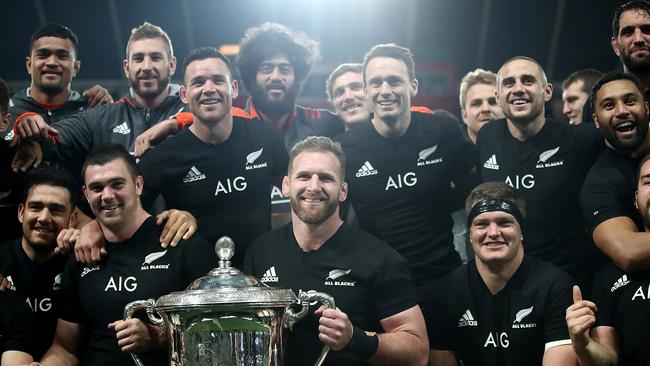Bledisloe Cup: All Blacks take final game of 2018 series to Japan as Wallabies eye first win since 2002
NEW Rugby Australia boss Raelene Castle admits winning a Bledisloe Cup is ‘top of my list’ and New Zealand have opened the door for it to finally happen in 2018 by shifting a home game to Japan.

Rugby
Don't miss out on the headlines from Rugby. Followed categories will be added to My News.
NEW Rugby Australia boss Raelene Castle admits winning a Bledisloe Cup is the only thing that ticks the box for a “successful” Wallabies season and New Zealand have opened the door for it to finally happen in 2018 by shifting a home game to Japan.
The NZRU announced on Wednesday they would stage the third Bledisloe Cup clash in October at the Nissan Stadium in Yokohama, Japan — the venue for the Rugby World Cup semi-finals and final in 2019.
Normally the game would have been played in New Zealand, given Australia hosted two home games last year. But, clearly tempted by the cash injection available by selling a Bledisloe Cup game to Japan, the Kiwis have given up the advantage.

It’s easier said than done, of course, but the Wallabies need only to win one of the first two games in Sydney and Auckland to get a decider on neutral ground in Japan.
The All Blacks beat the Wallabies in their last transplanted game in Japan — a fourth clash in 2009 — but the Aussies beat the New Zealanders in Hong Kong in 2010.
All Blacks coach Steve Hansen said the chance to play at a major World Cup venue would be beneficial for his team ahead of 2019 but Michael Cheika will no doubt be more interested in the chance to claim a major psychological milestone and win the first Bledisloe Cup for Australia since 2002.
The Kiwis will be confident it won’t get that far, however — the series has only gone to a decider twice in the last decade.
Castle has only been in the CEO’s chair for two weeks but as a Kiwi is a lifelong rugby fan and she already understands the value placed on the Wallabies’ performances against the All Blacks.
“If you look around the walls (at RA headquarters), there is a history of the Wallabies winning, Castle said.
“That’s the expectation the rugby public have, quite rightly. You’re never going to win 100 per cent of the games all the time.
“But there is no doubt we need to win the Bledisloe Cup. It doesn’t really matter what we do on the Spring Tour, until we win a Bledisloe Cup it won’t be seen as a successful Wallabies season. So that’s no.1 on the priority list. Winning is at the top of the list. It is not the catch-all to fix all your issues, but it certainly helps.”

Castle heads to Perth on Thursday to continue her listening tour, and in the case of WA, mend damaged bridges after the Force’s closure last year.
Castle has met with other state bosses and rugby stakeholders and said the overwhelming feedback was all parties are sick of the infighting.
“They don’t want to see a fractured sport. They want to see a united sport,” Castle said.
“There have been some challenges but we’re actually tired of that, we really want to come together now and make sure we are moving forward. That’s been the overwhelming piece of feedback I have had.”
Like her predecessors for at least decade, Castle will continue to push for governance reform to better align Australian rugby but she indicated she is not interested in trying to impose a top-down, centralised model.
“I think the centralising is important around systems and structures and shared services but not necessarily governance, because I think there is a level of — for me — pride in who you are, whether you be a Red or a Waratah or a Brumby, or from South Australia or Northern Territory,” Castle said.
“But there is no doubt when you see effective governance at work, you see better decision making. I don’t think anyone would say in rugby that we have governance right across the whole of the sport, so that’s a big piece of work that’s going to need to be looked at.”
Some feel the future of Super Rugby as a viable competition will rest entirely on this season; specifically whether a reheated 15-team model will prove any better financially than the disastrous 18-team model.

The ARU proposed a trans-Tasman comp to the NZRU last year but were rebuffed, and while Castle was noncommittal about her view on SANZAR’s future after the new TV deal in 2020, she acknowledged “strategic discussions need to be had.”
“The landscapes that all sports have to face, as they all move into the world of new TV deals, means that everyone is going to have to be reviewing what they’re doing and how they’re delivering it,” Castle said.
“SANZAR is no different. Those conversations are happening at a SANZAR level and we have to think about what the sport looks like as we move into those broadcast negotiations, no doubt.”
Castle said Australia had to be careful about getting “isolated” if it wasn’t open to compromise in the SANZAR alliance.


